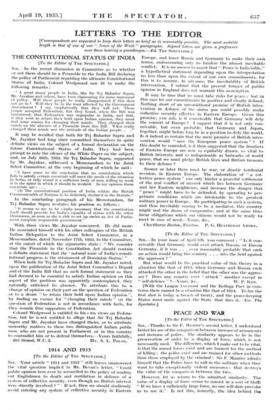1914 AND 1935
[To the Editor of TILE SPECTATOR.] .Sos.—Your article " 1914 and 1935 " still leaves unanswered the vital question implied in Mr. Bevan's letter, " Could public opinion here ever. be reconciled to the policy of sending out Englishmen to death and mutilation in defence of a system, of collective security, even though no British interest were directly involved " If not, then we should studiously avoid entering any system of collective security in Eastern
Europe, and leave Russia and Germany to make their own terms, endeavouring only to localize the almost inevitable conflict. It is no answer to assert that " Peace is Indivisible," a hypothetical statement depending upon the interpretation no less than upon the extent of our own commitments, for this is to assume, in advance, the inevitability of British intervention. I submit that the present temper of public opinion in England does not warrant this assumption.
It may be true that we must take risks for peace ; but in this case let our commitments be positive and clearly defined. Nothing short of an unconditional promise of British inter- vention in defence of the status quo could possibly make collective security effective in Eastern Europe. Given this promise, you ask, is it conceivable that Germany will defy the concert of Europe ? I suggest that it is not only con- ceivable, but even probable, that Germany and Japan, together, might before long be in a position to defy the world. Is it indeed so certain that the mere promise of British inter- vention would " save the European peace system " ? If this doubt be conceded, is it then suggested that the frontiers of Eastern Europe are now so equitably drawn, so vital to British interests, and so indispensable as bulwarks of world peace, that we must pledge British lives and British treasure to their defence ?
Sooner or later there must be war, or drastic territorial revision, in Eastern Europe. The elaboration of a col- lective peace system " can only hinder a peaceful settlement of the real conflict of interest which lies between Germany and -her Eastern neighbours, and increase the danger. that " peace " might have to be defended, by operating to per- petuate conditions which are intolerable to the greatest military power in Europe. By participating in such a system, and thus inevitably ceasing to be a mediator, this country might seal the doom of compromise, and at the same time incur obligations which our citizens would not be ready to meet in case of need.--Yours,






































 Previous page
Previous page